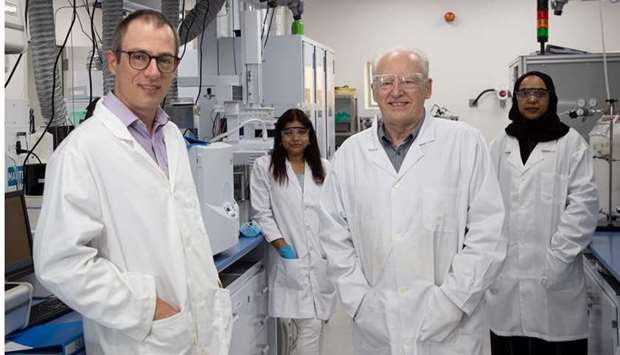In an effort to find a more efficient waste disposal solution and to boost food production in the country, a team of researchers from Qatar Foundation’s (QF) Hamad Bin Khalifa University (HBKU) is exploring the means to utilise food waste and other organic matter for producing biochar, Gulf Times has learnt.
The research is led by Dr Gordon McKay, professor of sustainable development at HBKU and funded by QF’s Qatar National Research Fund. Installation of a large pilot plant for the project at Education City is also expected later this year.
Biochar, also known as agriculture’s black gold due to its charcoal-like appearance, adds great value to the soil.
“Biochar is a charcoal-like substance that’s produced when agricultural waste, plant matter (leaves, trunks, roots), manure or other organic material is heated in a zero- or low-oxygen environment – a process known as pyrolysis,” said Dr Hamish Mackey, associate professor, College of Science and Engineering (C SE), HBKU.
Preliminary studies by the group using biochar produced from local waste cabbage have been "very promising". Pot tests were done by adding biochar to sandy soil to investigate the effect of biochar on the growth of basil plants.
Adding only 2% biochar resulted in the doubling of shoot height as well as the number of leaves per plant. It also reduced the uptake of aluminum – an undesired element by the plant while increasing the uptake of desirable trace metals and salts. The water retention capacity of the soil nearly doubled; this is likely to have a considerable effect on the irrigation needs of the plants.
The research is led by Dr Gordon McKay, professor of sustainable development at HBKU and funded by QF’s Qatar National Research Fund. Installation of a large pilot plant for the project at Education City is also expected later this year.
Biochar, also known as agriculture’s black gold due to its charcoal-like appearance, adds great value to the soil.
“Biochar is a charcoal-like substance that’s produced when agricultural waste, plant matter (leaves, trunks, roots), manure or other organic material is heated in a zero- or low-oxygen environment – a process known as pyrolysis,” said Dr Hamish Mackey, associate professor, College of Science and Engineering (C SE), HBKU.
Preliminary studies by the group using biochar produced from local waste cabbage have been "very promising". Pot tests were done by adding biochar to sandy soil to investigate the effect of biochar on the growth of basil plants.
Adding only 2% biochar resulted in the doubling of shoot height as well as the number of leaves per plant. It also reduced the uptake of aluminum – an undesired element by the plant while increasing the uptake of desirable trace metals and salts. The water retention capacity of the soil nearly doubled; this is likely to have a considerable effect on the irrigation needs of the plants.
 “Two of biochar’s most valued benefits for plant growth are nutrient and water retention. When worked into the soil, biochar can prevent nutrients from leaching out and water from draining out of the soil, making biochar an effective soil amendment,” said Dr Tareq al-Ansari, assistant professor, College of Science and Engineering, HBKU.
“Two of biochar’s most valued benefits for plant growth are nutrient and water retention. When worked into the soil, biochar can prevent nutrients from leaching out and water from draining out of the soil, making biochar an effective soil amendment,” said Dr Tareq al-Ansari, assistant professor, College of Science and Engineering, HBKU.“Food waste is a major issue both in Qatar and globally. Through this project, we are laying the groundwork for a circular economy in agriculture wherein we use food waste for the regeneration of natural systems and enhanced agricultural productivity,” continued Dr al-Ansari.
Biochar production is also a carbon-negative process, as it effectively reduces CO2 in the atmosphere. The waste used for making biochar would release carbon dioxide to the atmosphere if it is left to decompose naturally. Through pyrolysis, its carbon content can be transformed into a stable structure that doesn’t react to oxygen, ultimately reducing carbon dioxide in the atmosphere.
Because of its porous nature, biochar can improve the water retention capacity of soil, allowing plants to have more water available to them for a longer period of time. Biochar is most effective when applied to soils with poor fertility making it especially useful for plants in arid to semiarid environments, regions prone to drought, and areas with limited irrigation capabilities.
“It is more important to note that not all biochars are the same. Their properties depend heavily on the production parametres such as temperature and heating rate. Similarly, their effects vary depending on the kind of soil that is being amended, maximum improvement is seen in sandy soil which is prevalent in Qatar,” said, Dr Mackey.
“The next step is carrying out long-term evapotranspiration tests to estimate the loss of water from both plants and the soil after addition of biochar. This will be key in determining how much real water savings can be realised,” explained, Dr al-Ansari.
The group is expecting installation of a large pilot plant at Education City this year, which will allow them to scale up the biochar production capacity and move towards field scale testing, a crucial step before commercialisation.
“Field tests will be conducted over an extended period of time so we have solid data to demonstrate the effects of biochar on the soil as well as the plants and most importantly quantify potential water savings,” Dr Mackey added.


